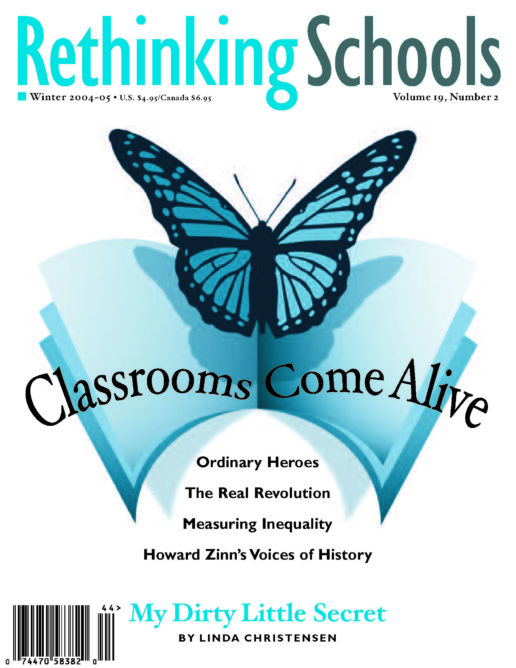BOOK REVIEW: We the People
Voices of A People’s History of the United States
Howard Zinn and Anthony Arnove eds.
(Seven Stories Press, 2004) 665 pp. $18.95.
In an article called “Unsung Heroes,” excerpted in Rethinking Our Classrooms, Vol. 2, Howard Zinn describes being challenged by a student: “I read in your book A People’s History of the United States about the massacres of Indians, the long history of racism, the persistence of poverty in the richest country in the world, the senseless wars. How can I keep from being thoroughly alienated and depressed?”
It’s a refrain I’ve heard before. The version I get is, “Didn’t we ever do anything good in history?” The key word in this sentence is “we.” Students have been taught to identify with “our” country. But unfortunately “our” country has been reduced to the actions of the elites: the presidents, the generals, the business leaders. Thus students can feel personally attacked when teachers raise critical questions about “our” country’s political and economic choices.
Voices of a People’s History of the United States, edited by Zinn along with Anthony Arnove, celebrates an alternative national identity—one of resistance to racism and slavery, of organization for women’s rights, of struggle for union recognition, of opposition to war and militarism, of agitation for workplace and social democracy. “Didn’t we ever do anything good in history?” Yes, we did, as Zinn and Arnove ably demonstrate.
Voices follows Zinn’s classic A People’s History of the United States, chapter by chapter. It features speeches, songs, diary excerpts, poems, newspaper articles, and personal narratives illustrating themes in Zinn’s earlier book. Some of the writers are well-known: Mother Jones, Emma Goldman, Eugene Debs, Martin Luther King Jr., even Bob Dylan. Others are more obscure, but just as worthy, such as L. D. Barkley and Frank Smith, inmates who participated in the uprising at New York’s Attica State Prison in 1971. (“We are men! We are not beasts and we do not intend to be beaten or driven as such.”) Pick up the book, open it to any page, and start reading. It’s impossible not to find something that could be used in a social studies or language arts class.
I read Voices against the backdrop of the U.S. siege of Falluja while reports leaked out—mostly in the British press—about the tremendous civilian suffering there. U.S. history is filled with military invasions—against Indian nations, Mexico, the Philippines, Vietnam. But it’s also populated, as Voices demonstrates so eloquently, with critics of war and empire. Zinn and Arnove have selected readings that highlight the links between struggles against racism and against war.
For example, Frederick Douglass denounced the U.S. conquest of Mexico in the 1840s as “a murderous war—as a war against freedom, against the negro, and against the interests of the workingman of this country—and as a means of extending that great evil and damning curse, negro slavery.”
One hundred and twenty years later, Muhammad Ali defied the draft during the Vietnam War: “No, I am not going 10,000 miles from home to help murder and burn another poor nation simply to continue the domination of white slave masters of the darker people the world over. This is the day when such evils must come to an end.”
In his introduction to the book, Zinn writes that he wants to “bring into light the hidden resistance of the people against the power of the establishment: the refusal of Native Americans to simply die and disappear; the rebellion of black people in the anti-slavery movement and in the more recent movement against racial segregation; the strikes carried out by working people to improve their lives.
To omit, or to minimize, these voices of resistance is to create the idea that power only rests with those who have the guns, who possess the wealth, who own the newspapers and the television stations. I want to point out that people who seem to have no power, whether working people, people of color, or women—once they organize and protest and create movements—have a voice no government can suppress.
Zinn and Arnove bring these aspirations alive in this stunning new volume. And in so doing they help us attempt to bring these aspirations alive in our classrooms.

